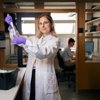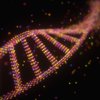Fritextsökning
Artiklar per år
Innehållstyper
-

Venomaid's rapid test aims to find the right snake bite treatment
Every six seconds, someone on our planet suffers a snake bite, and each time, a race against the clock begins. What kind of snake was it, and which antivenom can help? Danish company Venomaid Diagnostics is working hard to develop solutions to a problem that claims countless lives, especially in tropical countries.
-

Virology professor on the threat from X: ”The next pandemic could be worse“
The question is not if, but when we will be affected by a new unknown virus that causes yet another pandemic. Are we sufficiently prepared? "Absolutely not!", responds virologist Niklas Arnberg.
-

An organ seldom in the spotlight – but utterly vital
The kidneys consist of more than 40 types of cells and have more functions in the body than most people know. Julie Williams leads AstraZeneca’s work in preclinical research about kidney diseases. “They are probably one of the most complicated organs in the body, and I like a challenge”, she says.
-

Cancer researcher: “We can do better and reduce suffering”
Lund University researcher Catharina Hagerling is developing innovative methods to understand metastatic cancer, aiming to create more targeted treatments for patients with disseminated cancer.
-

A new scientific event in Gothenburg
Life Science Sweden is holding an event in Gothenburg for the first time.
-

Who pays for Rebecca Doe – and all of us?
Anna Törner on how easily we get used to the idea that healthcare is free - when it really is about how and who pays for it
-

Ukraine war fuels rise of totally resistent bacteria
War-torn Ukraine is not just suffering from hostile attacks from a foreign aggressor, but also from the threat of a totally resistant and contagious bacteria.
-

Security flaw in Swedish breast cancer screening software – woman passed away
A lack of safeguard in Sectra's software led to a woman with breast cancer receiving an incorrect diagnosis. She later passed away. The software is used in 20 out of 21 regions in Sweden. It is also used in neighbouring Nordic countries. “Extremely serious,” says the Sectra CEO to Medtech Magazine.
-

Marie Gårdmark: “What to expect from Trump’s second term?”
One may complain about the complex multinational system in EU, but it gives us some predictability that cannot be easily overturned by different member states political agendas, writes Marie Gårdmark in a column.
-

The business coach: “We need to learn from our mistakes”
The past year has been challenging for many biotech companies, with several comapanies facing financial stress and bankruptcy. To understand how entrepreneurs can navigate these tough times, Life Science Sweden spoke to Pia Keyser, a business coach at Umeå Biotech Incubator, who has worked with many companies in the industry.
-

GSK pays 2.2 billion dollars to settle Zantac lawsuits
British drugmaker Glaxo Smith Kline, GSK, has struck a 2.2 billion dollar settlement, thereby resolving a vast majority of the liability cases pending against the company in the U.S. that alleged its discontinued drug Zantac caused cancer.
-

EMA review confirms a risk of new cancer after CAR-T
CAR-T cancer therapies can, in rare cases, induce secondary cancers. The European Medicines Agency (EMA) now recognises this and requires a warning label to be attached to the product information and patients to be followed up for life.
-

Nobel Prize winner Torsten Wiesel turns 100: “Old men like me should use their experience to help the young”
In 1955, a young Torsten Wiesel jumped on a boat to the US and embarked on a fabulous career as a neuroscientist, crowned with a Nobel Prize for his work. Now 100 years old, he looks back on an intense life and his upbringing in Stockholm, Sweden, which shaped his desire to help the vulnerable in society.
-

Nocebo – the evil twin that makes you feel worse
The placebo effect is well known in healthcare, but not so its opposite: nocebo. “The effect is small, but it can have major repercussions,” says Uppsala researcher Charlotte Blease, co-author of a book on the phenomenon.
-

Venom from the deathstalker carries radiopharmaceuticals to the brain
In order to target cancerous brain tumours with radionuclides, the problematic blood-brain barrier must first be crossed. Life Science Sweden has visited a KI researcher who is trialling an unusual approach ‒ using scorpion venom.
-

“What is important is to create an overview and understanding from different perspectives”
Scientist Jochen Schwenk analyses blood proteins using proteomics to improve our understanding of disease and health. This year, he is moderating the Lab & Diagnostics of the Future event.
-

Failed to read the fine print – lost his life’s work
A celebrated CEO and co-founder of a pioneering lab company one moment – the next, fired, kicked out and written out of the company’s history. This is the story of a Swedish entrepreneur who was going to raise US venture capital to strengthen his company but lost his life’s work instead.
-

Business Sweden: “Companies have a lot to offer in data-driven precision medicine”
Data-driven precision medicine can potentially solve major healthcare problems, states Business Sweden in a new report on the subject.
-

“A major energy boost for the entire cancer vaccine field”
The development of cancer vaccines has accelerated in recent years. Norwegian Ultimovacs is one of the companies attempting to develop a new type of treatment line for cancer patients, and the company recently presented positive data from a phase II study.
-

Rapid developments in AI – “All stakeholders are struggling to understand it”
Artificial intelligence is being discussed more and more, and developments in the field are moving rapidly. As the Swedish Medical Products Agency testifies, keeping up with developments is not easy.
-

New report: Fewer PhDs in life sciences
A new report from Vinnova suggests that competency returns in the life science sector are declining.
-

Individual DNA passport could result in fewer drug side effects
You may be required to show a DNA passport when you pick up medicines at the pharmacy in the future. According to a new study, patients might suffer 30% fewer side effects if the drug treatment is adapted to their genes.
-

"Unclear proposal from the EU Commission on how to solve the MDR challenges"
Even before the EU regulation on medical devices (MDR) came into force, medical technology companies and doctors were concerned that it would endanger the availability of medical devices in the EU. Unfortunately, the fears have come true.
-

"Are we doing business the wrong way around in the Life Science Sector?"
For the past 50 years we have created solutions for problems that we thought would solve the problems. Pharmaceuticals have created big block buster drugs which were great for that time but now we realise that these drugs were in fact only tested in white men and certainly not for patients who are older who are taking a number of medications.